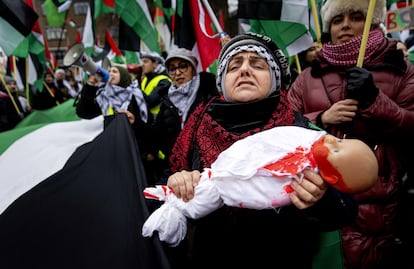Concern in Israel over imminent UN court decision on Gaza genocide accusation
Prime Minister Netanyahu assembles a crisis cabinet and submits declassified documents to the International Court of Justice to rebut South Africa’s claim. Judges are expected to decide on precautionary measures on Friday


Israeli Prime Minister Benjamin Netanyahu urgently convened a crisis cabinet on Thursday to anticipate possible scenarios before the preliminary decision by the International Court of Justice (ICJ), scheduled for Friday, regarding the accusation by South Africa against Israel of genocidal intent in Gaza. The response by the United Nations’ highest court could lead to the imposition of precautionary measures such as a stay on the offensive that the army unleashed three months ago in the Gaza Strip, with a death toll of more than 25,000, following the October 7 attack by Hamas militias that caused 1,200 deaths in Israeli territory. The cabinet meeting was attended by senior state officials such as Attorney General Gali Baharav-Miara and Justice Minister Yariv Levin, in a sign of concern about the consequences of the upcoming decision in The Hague.
The Israeli defense in the case has presented to the ICJ more than 30 declassified documents involving government and military leaders, some of them authorizing humanitarian aid into the Palestinian enclave, in a bid to rebut the charges of genocidal intent at “the highest levels” of the executive, as reported Thursday by The New York Times.
South Africa’s lawyers in The Hague argued that genocidal intent cannot be presented as simple isolated acts by “out-of-control groups.” In their accusation, they included 50 public statements made by ministers, lawmakers and members of the military since the start of the war, on October 7, as proof of Israel’s alleged intentions.
The statements collected in the case include some from Nissim Vaturi, the right-wing deputy speaker of the Israeli Knesset, who made calls to “wipe Gaza off the face of the earth,” and the “elimination” of the 100,000 Palestinians that still remain in northern Gaza. “I have no mercy for those who are still there,” he added. The prime minister himself appears in South Africa’s case documents for repeatedly mentioning Amalek, the enemy nation of the Israelites in the Bible and whose extermination God asked King Saul for: “Remember what Amalek did to you, says our Holy Bible. And we remember it.”
Also included in South Africa’s claim are statements by Defense Minister Yoav Gallant: “We are fighting human animals,” he said, vowing to act accordingly. The Minister of Historical Heritage, Amijai Eliyahu, raised the option of dropping an atomic bomb on Gaza. He is still in office. “There is only one solution to cure cancer: eliminate all cancer cells,” said the Israeli ambassador to the U.N. Gilad Erdan in reference to the Gaza war. Israel is trying to downplay these statements, saying that they have been misinterpreted.
With the declassified material, Israel intends to demonstrate to the U.N. judges that these inflammatory statements by senior Israeli officials presented to the court by South Africa lack substance, compared to the executive decisions and official orders of the Israeli government and the General Staff of the Armed Forces, allegedly aimed at protecting the lives of Gaza’s civilian population.
Among other documents cited by The New York Times are minutes of government sessions held at the end of October, in which Netanyahu himself ordered to facilitate the supply of humanitarian aid, water and fuel to the Strip. There were also recommendations for the installation of field hospitals.
Water and electricity
The New York Times added that the official documents it has been able to consult are “highly curated and omit most wartime instructions given by the cabinet and the military.” Nor does Israel’s submission include the decisions taken in the first 10 days of the war, when the government gave orders to block all aid and cut off the supply of water and electricity to the Strip.
Israel maintains that it has no genocidal intent in its military offensive in Gaza and that it would be defenseless if it did not repel, through the use of force in legitimate defense, the attacks by the Hamas militia. The Israeli delegation has asked the ICJ to refrain from issuing precautionary measures and to close the case.
The South African petition includes nine protection mechanisms against “acts of a genocidal nature” in Gaza, among them, the one that demands a halt to the Israeli offensive. South Africa invoked the Convention on the Prevention and Punishment of the Crime of Genocide (1948) in its application to the judges. This treaty prescribes that force cannot be used to the point of committing the so-called “crime of crimes,” although it requires that the existence of genocidal intent be conclusively proven. Precautionary measures, however, do not require proving that a genocide has occurred, it is enough that it is plausible.
The ICJ orders are binding, but the U.N. does not have the capacity to enforce them. In any event, Israel’s presence at the court has drawn even more international attention to a conflict in which more than 1% of the population of the Gaza Strip has died according to Gaza health officials, most of the homes and infrastructure have been razed to the ground and two million civilians have been displaced.
Sign up for our weekly newsletter to get more English-language news coverage from EL PAÍS USA Edition
Tu suscripción se está usando en otro dispositivo
¿Quieres añadir otro usuario a tu suscripción?
Si continúas leyendo en este dispositivo, no se podrá leer en el otro.
FlechaTu suscripción se está usando en otro dispositivo y solo puedes acceder a EL PAÍS desde un dispositivo a la vez.
Si quieres compartir tu cuenta, cambia tu suscripción a la modalidad Premium, así podrás añadir otro usuario. Cada uno accederá con su propia cuenta de email, lo que os permitirá personalizar vuestra experiencia en EL PAÍS.
¿Tienes una suscripción de empresa? Accede aquí para contratar más cuentas.
En el caso de no saber quién está usando tu cuenta, te recomendamos cambiar tu contraseña aquí.
Si decides continuar compartiendo tu cuenta, este mensaje se mostrará en tu dispositivo y en el de la otra persona que está usando tu cuenta de forma indefinida, afectando a tu experiencia de lectura. Puedes consultar aquí los términos y condiciones de la suscripción digital.








































